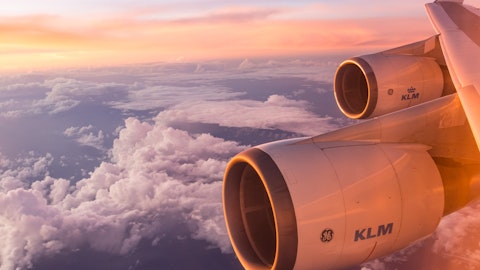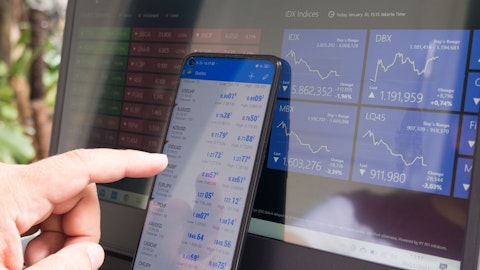Michael O’Leary: Okay. I wouldn’t get into pricing on Q4. We would never break it down on a quarterly basis. But you can work it back from our full year guidance. Yes, we have narrowed the range slightly, but more to reflect their behavior in Q3. We are still somewhere between €1.85 billion and €1.95 billion. But detail on Q4 pricing and our cost, we wouldn’t get into at this point in time, Muneeba. On EU share ownership, we continue – we are the only airline that is very close to 50-50 EU ownership. Other competitors like easyJet and Weeze are way below 50%, but that’s a matter for the EU commission not for us. I do believe, though, that if we did a share buyback, I think we would probably be looking at trying to buy ADRs and ordinaries, I think it would be in our interest to do both.
Although it is – in the past, we have found it easier to buy ordinaries in Europe. It has been very difficult for us to buy ADRs. One of the challenges we faced with the ADRs is they tend to be quite tightly held by a number of very large institutions in the U.S. And when we come looking to do share backs, they all go buy somebody else’s ADRs. But if we are unsuccessful in executing share buybacks of ADRs, we would simply buy more ordinaries and then over a period of time, as we have done in the last 2 years since it continue to use the fairly draconian powers we have to dis-apply non-EU buyers of the ordinary shares. But I would think the working theory – my working assumption would be, if we are returning cash to shareholders by way of further share buybacks, we would probably split that 50-50 between the ADRs and the ordinary set, so that we balance the EU ownership rules.
Thanks Muneeba. Next question, please.
Operator: The next question comes from Alex Paterson from Peel Hunt. Please go ahead. Your line is now open.
Michael O’Leary: Alex, hi.
Alex Paterson: Good morning everyone. I just wondered if you could give any more color on the commercial agreement you have got with the GDSs and now with two OTAs. Are they paying exactly what a customer would pay if they book directly on your website, or are there any fees in between like an API fee or anything else?
Michael O’Leary: And is there a second one?
Alex Paterson: No, that was it – for everybody else.
Michael O’Leary: So, I mean what we are trying to do, there is no – we don’t charge them anything. We are very willing to give people direct access into the GDSs and the OTAs. They – I mean the critical thing for us is to eliminate the kind of illegal screen scraping. And if we can kind of eliminate the illegal screen scraping, that makes it much more difficult for these kind of OTA pirates to exist. They get direct access to our fares and ancillary prices in our website. They undertake, so what we do – I think what we do is we feed them from the cost of the inter-digital piracy by giving them the direct fee. And they in return agreed that the booking will be made on the – in our website, directly in our website.
So, we have the contact with the customer, both the e-mail contact and the payment details. And they agree that they will not levy any fees or charges on our underlying airfares or ancillary. That does not necessarily preclude them from charging some kind of fee for their services as many travel agents now do, but it has to be an identifiable fee for say, the loveholidays, for example, they made that they generally do package holidays, they may take something or they may make their money out and what the other elements of the package they sell. But the customer booking with them on Ryanair is paying the underlying Ryanair airfare and the underlying Ryanair ancillary prices without any inflation, price inflation or price distortion. And we don’t, at the end of the day, have a difficulty if – as with the GDS distribution of travel agencies want to levy a fee for what they serve.
As long as the customer knows that that’s the travel agent fee, we don’t have a problem with it. We think ultimately, over time, it would be difficult, consumers will certainly move away from travel agency fees if the fees are unreasonable, and we will just increasingly book directly in the ryanair.com website. But critical to all of this is protecting the consumer from overcharges and then not having some OTA in a position like Booking.com is with the hotels where they control hotel distribution, and they charge them 15%, 20% of revenues for the distribution. It may work for the hotels, but that certainly wouldn’t work in a low-margin industry like airline industry for us. Eddie, do you want to add anything to that?
Eddie Wilson: Yes. I mean it’s just like when the APIs are fully functioning out there, you will see that people – it will be absolutely clear in the case of somebody buying a package of the elements that they are buying. And they will see that they are getting the Ryanair price, the Ryanair ancillaries, and there is no ability within that flow to add on extra charges. So, in that sense, it will be very transparent for air consumers because some of the most egregious complaints we get here are from consumers who buy through pirate screen scrapers. They don’t get adding of that, what you guys don’t get any emails to service emails and they are the ones that turn up at the desk and didn’t realize they can get any of the three or four emails the time had to check in online beforehand.
So, when these things are up and fully functioning, we have done the deals and while we are working on them in the background and the APIs are up there, you will see how transparent it is.
Michael O’Leary: Okay. Thanks Eddie. Thanks guys. Next question, please.
Operator: Our final question we have time for today is from Neil Glynn from AIR Control Tower. Please go ahead, Neil. Your line is now open.
Neil Glynn: Good morning.
Michael O’Leary: Neil, hi.



